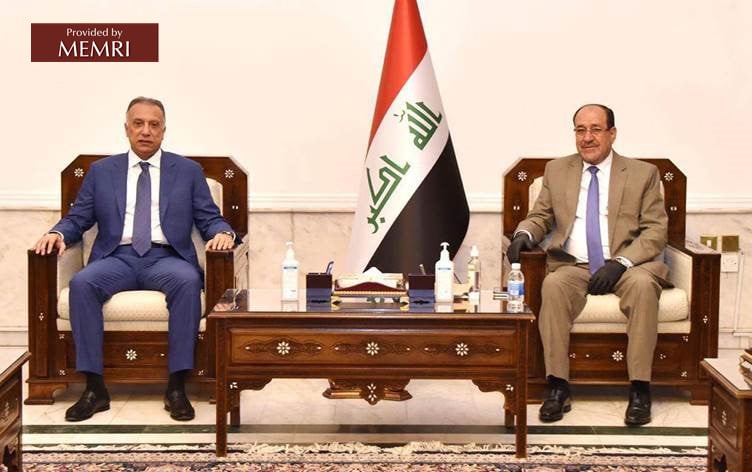In a June 21, 2020 article in the UAE-affiliated London-based Al-Arab daily, Iraqi writer Ibrahim Al-Zubaidi argued that Iraqi Prime Minister Mustafa Al-Kadhimi is "too scared and hesitant and weak to stand up to the Iranian occupation."
The writer argued that Al-Kadhimi made some overblown promises about eradicating corruption, holding terrorists and embezzlers accountable, confining weapons to the government security apparatus, and restoring Iraq's sovereignty and other radical reforms, even before the completion of his cabinet.
Al-Zubaidi said that though it has been only two months since Al-Kadhimi took office, his "controversial" moves and statements so far seem to contradict the promises he made, indicating that he is not the right man for the job.
The following are translated excerpts from Al-Zubaidi's article:[1]

Al-Kadhimi during his visit to Nuri Al-Maliki, former prime minister and head of the State of Law parliamentary bloc (source: Rudaw.net, June 16, 2020).
"[Al-Kadhimi] absolved the government of his ousted predecessor, Adel Abdul-Mahdi, of any sin. Rather, he deemed the oppressed and ripped Iraqi people to be rebellious and ungrateful because they did not praise the great achievements [of Abul-Mahdi's government], nor did they offer their gratitude to that government.
"This is despite the fact that 600 demonstrators were shot dead by Abdul-Mahdi's allies, the Hashad [i.e., Popular Mobilization Units, PMU], in addition to hundreds who were wounded or went missing and whose murders or disappearance Al-Kadhimi pledged to investigate, but in reality he did nothing.
"Furthermore, [Al-Kadhimi's] aide announced that the previous government left only $300 million in the state coffers, yet Al-Kadhimi referred the previous officials to retirement when he should have sent them to court.
SUPPORT OUR WORK

"[Al-Kadhimi] ordered his security forces to storm of the headquarters of the terrorist Tha'ir Allah in Basra to arrest the gunmen who opened fire on the demonstrators, but again the authorities released them shortly thereafter. He returned three military leaders who were dismissed by his predecessor, the ousted Prime Minister Adel Abdul-Mahdi, yet he followed that decision by submitting to the pressure of Masoud Barzani by appointing the latter's secretary, Fouad Hussein, as minister of foreign affairs, despite there being many question marks about [Hussein's] performance, and numerous reports about his corruption, and the fact that he does not believe in something called Iraq.[2]
"[Al-Kadhimi] also agreed to appoint Ehsan Abdul Jabbar, director of the Iraq Petroleum Company, as oil minister, even though there are 16 corruption cases in the Integrity Commission against him from his time as a general manager of the Iraq Petroleum Corporation.
"Al-Kadhimi ordered the release of the detained protesters, yet no one has been released yet... He who heads the Iraqi intelligence instructed his security forces to find out if they were held in secret prisons![3]
"[Al-Kadhimi] visited the headquarters of the PMU and took off his civilian jacket and wore [the jacket] of the PMU, when he knew that the Iraqi people were expecting that he would curb these militias, confiscate their weapons, and put an end to their disdain for the state and citizens.
"And even more, Al-Kadhimi warned while he was surrounded by the PMU leaders who constantly brag that they are above the state and the law, that some parties seek to create a gap between the PMU and the state. He said: 'The Hashad was established in response to grand ayatollah Ali Al-Sistani's fatwa, and undermining their sacrifices is unacceptable.'
"He suspended the salaries of Rafha refugees and those who receive double salaries, but he backtracked and gave in to their protests and canceled his decision, even though he knows that... This will have a negative impact on the Iraqi public that continue to demand social justice and seek an end to the organized robbing of the bankrupted state's funds.[4]
"Then his greatest sins were when he visited Nuri Al-Maliki, who is considered by millions of Iraqis to be the head of the deep state, and the leader of the armies of the corruption and corrupted. Instead of visiting him, he should have presented him to justice... However, Al-Kadhimi's aides try to justify his position by underling that he criticized Al-Maliki during his visit to Mosul, even though he did not name him, when he said that Mosul fell into ISIS hands because of mismanagement and corruption.[5]
"It is said that Al-Maliki was angered by that statement, and it seems that Al-Kadhimi could not bear the consequences of Al-Maliki's anger against him, so he rushed to visit him to apologize.
"One should wonder if Al-Kadhimi has come to realize, after his promises, that his opponents who oppose social justice, integrity, and patriotism are too big for him to take down, and that he is incapable of fighting them? Or is he adhering to the political strategy of 'take and then demand,' a step-by-step policy to achieve his ultimate goals? Or is he originally not interested in leading his people in the battle of liberating his country from occupation, corruption, and lack of dignity?
"The bottom line is that Iraq, under the current strong and sole Iranian occupation that sponsors the octopus of corruption, failure, foreign collaboration, does not need a prime minister who is courteous, calm, hesitant, afraid, and weak, like Mustafa Al-Kadhimi, but rather it needs someone like Alexander the Macedonian, Hitler, Mussolini, or Tarzan."
[1] Alarab.co.uk, June 21, 2020.
[2] Fouad Hussein, an Iraqi Kurd, and the writer considers him to be a separatist and his loyalty is to Kurdistan, not Iraq.
[3] Al-Kadhimi was and still heads the Iraqi intelligence service and the writer presumes that he should know where these secret prisons are.
[4] After 1991, Saudi Arabia hosted about 5,391 Iraqi Shi'ite refugees who fled the Saddam regime across the borders and were housed in the Rafha camp. In 2013, the Iraqi parliament passed a law giving these refugees and their families monthly salaries.
[5] Nuri Al-Maliki was Iraq's prime minister in 2014 when ISIS took over Mosul.




